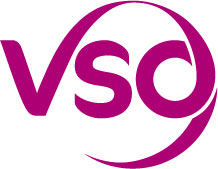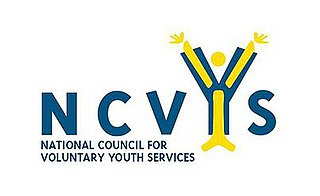
Voluntary Service Overseas (VSO) is a not-for-profit international development organization charity with a vision for a "world without poverty" and a mission to "bring people together to fight poverty and marginalisation". VSO delivers development impact through a blend volunteer model consisting of international, national, and community volunteers working together to develop the systems and conditions for positive social change As of 2018, VSO worked in 24 countries in Africa and Asia

The United Nations Foundation was launched in 1998 with a $1 billion gift from Ted Turner to support the United Nations' causes. The creation of the Foundation was intended to encourage other donors to also support the UN in its activities. The main issue areas that the Foundation addresses are child health, climate change and energy, sustainable development, technology, women, girls, and population, and supporting the United Nations. Some of the biggest global campaigns that the UN Foundation has been involved in include Nothing But Nets, the Measles & Rubella Initiative, the Clean Cooking Alliance, Girl Up, Shot@Life, the Digital Impact Alliance, and the Better World Campaign, among others.
Early childhood education is a branch of education theory that relates to the teaching of children from birth up to the age of eight. Traditionally, this is up to the equivalent of third grade. ECE emerged as a field of study during the Enlightenment, particularly in European countries with high literacy rates. It continued to grow through the nineteenth century as universal primary education became a norm in the Western world. In recent years, early childhood education has become a prevalent public policy issue, as municipal, state, and federal lawmakers consider funding for preschool and pre-K. It is described as an important period in a child's development. It refers to the development of a child's personality. ECE is also a professional designation earned through a post-secondary education program. For example, in Ontario, Canada, the designations ECE and RECE may only be used by registered members of the College of Early Childhood Educators, which is made up of accredited child care professionals who are held accountable to the College's standards of practice.
The World Population Foundation (WPF) was founded in 1987 in the Netherlands by Diana and Roy W. Brown. Their purpose was to create an organisation to draw attention to the effects of high birth rates and rapid population growth on maternal and infant mortality, communities and the environment, and to raise funds for population projects and programmes, with the ultimate aim of reducing world poverty and improving the quality of life of the world’s poorest people.
Christian Commission for Development in Bangladesh (CCDB) founded in 1972, immediately after the Bangladesh Liberation War, by the World Council of Churches (WCC) to succeed the Bangladesh Ecumenical Relief and Rehabilitation Services (BERRS). The organization asks local imams to talk about disaster preparedness in their Friday services as part of its Disaster Preparedness Programme.
A parent education program is a course that can be followed to correct and improve a person's parenting skills. Such courses may be general, covering the most common issues parents may encounter, or specific, for infants, toddlers, children and teenagers. These courses may also be geared towards parents who are considering having a child, or adopting one, or are pregnant.
The Bernard Van Leer Foundation funds and shares knowledge about work in early childhood development. The foundation was established in 1949 and is based in the Netherlands. It is a member of the Network of European Foundations for Innovative Cooperation (NEF). The foundation's income is derived from the bequest of Bernard Van Leer, a Dutch industrialist and philanthropist who lived from 1883 to 1958, and made his fortune from the packaging company he founded in 1919, Royal Packaging Industries Van Leer. After Bernard Van Leer's death in 1958, the foundation was given a clearer organisation and focus by his son Oscar Van Leer. From 1964 the Bernard Van Leer Foundation focused on young children, primary education and youth, and disadvantaged young children. It funded its first international project in Jamaica in 1966.

Co-founder of Jamaica AIDS Support for Life, Ian McKnight served as Executive Director for this organization from 1991 until 2002. Later he worked as Director of Targeted Interventions and Director for Social Marketing and Public Education with JASL. He then worked as Violence Prevention Specialist and Media and Communications Specialist on JA-STYLE, a USAID-funded/Ministry of Health adolescent reproductive health project.
IMPACT is an international initiative which focusses on preventive and social health and promote awareness and intervention to prevent avoidable disability. Founded in 1980s by Sir John Wilson, IMPACT was formed as a part of the UNs Decade of disabled people. The UK IMPACT Foundation (UKIF), which is the central organisation to its sister projects over the world, was formally registered as a charity in 1985. The organisation's international programme was formally set up by the United Nations General Assembly supported by the British government. Although it doesn't receive any financial assistances from these organisations, it is jointly promoted by the World Health Organization, UNICEF and the UNDP. IMPACT currently has projects focussing on disability prevention, social health, nutritional health, child health as well as disaster relief in some of the least developed nations in Asia and Africa, including countries like Bangladesh, Cambodia, India, Nepal, East Africa.The India wing of IMPACT also leads Community Health Initiatives in Rural Areas and is actively involved in initiatives to prevent infant mortality.
South African Education and Environment Project is a non-profit organisation serving children and youth through educational support at every level of academic development. The organisation helps young people who are neglected by South Africa's education system.
The Naz Foundation (India) Trust is a non-governmental organisation (NGO) in that country that works on HIV/AIDS and sexual health. It is based in the Indian capital of New Delhi.

The Ted Noffs Foundation is a nonprofit organization located in Randwick, New South Wales, Australia. Since its foundation in 1992, the foundation has grown from one residential treatment centre for adolescents to a broad range of initiatives, from four residential treatment centres for adolescents with drug and alcohol problems, to adolescent life management aftercare, family and adolescent counselling on an 'outclient' basis, schools counselling, indigenous counselling, an outreach/educational project called 'Street University' and a number of Social Enterprise endeavors such as fashion-oriented op-shops and 'Gideon's Shoes,' dealing in design, manufacture and retailing.

loveLife is a youth focused HIV prevention initiative in South Africa. The not-for-profit organisation promotes AIDS-free living among South African youth aged between 12 and 19 by employing a holistic approach to youth development and behaviour change that motivates adolescents to take charge of their lives for brighter futures.
Integrated Child Development Services (ICDS) is a government programme in India which provides food, preschool education, primary healthcare, immunization, health check-up and referral services to children under 6 years of age and their mothers. The scheme was launched in 1975, discontinued in 1978 by the government of Morarji Desai, and then relaunched by the Tenth Five Year Plan.

The National Council for Voluntary Youth Services (NCVYS) was a membership network of over 200 voluntary and community organisations, as well as local and regional networks, that work with and for young people across England. The organisation closed in 2016. For 80 years, NCVYS acted as an independent voice of the voluntary and community youth sector, working to inform and influence public policy, supporting members to improve the quality of their work, and also raising the profile of the voluntary and community sector's work with young people.
Early Years – the organisation for young children is a non-profit organisation based in Belfast, Northern Ireland. Formerly known as Nippa, it works to promote education and care services for young children. It provides support in the form of information and training to parents, childcare providers, employers and local authorities, as well as the development of programmes and projects to enhance the care and education provided for children.

Smile Foundation is a non-governmental organization based in New Delhi, India. It was established in 2002 and has a presence in 25 Indian states. As of 2017, the foundation reaches around 400,000 children and their families.
Curricula in early childhood care and education (ECCE) address the role and importance of curricula in the education of young children, and is the driving force behind any ECCE programme. It is ‘an integral part of the engine that, together with the energy and motivation of staff, provides the momentum that makes programmes live’. It follows therefore that the quality of a programme is greatly influenced by the quality of its curriculum. In early childhood, these may be programmes for children or parents, including health and nutrition interventions and prenatal programmes, as well as centre-based programmes for children.
The Australia Day Honours 2018 are appointments to various orders and honours to recognise and reward good works by Australian citizens. The list was announced on 26 January 2018 by the Governor General of Australia, Sir Peter Cosgrove.
The Global Child Development Group (GCDG) is an international, non-governmental organization founded in Bellagio, Italy in 2007, with a focus on the promotion of research, practice and policies focused on child development. The organization has a particular emphasis on children's social, cognitive, emotional, behavioural and motor development.







